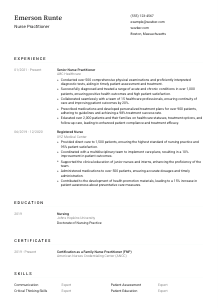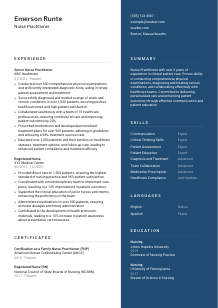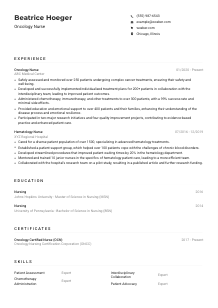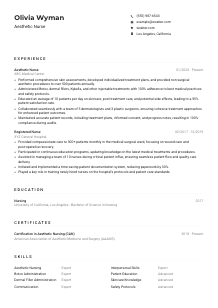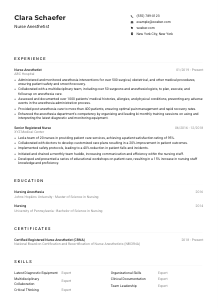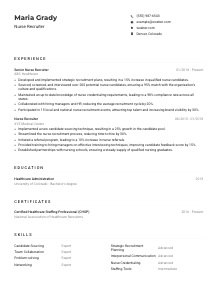Nurse Practitioner CV Example
Juggling diagnoses but feeling puzzled by your CV? Delve into this Nurse Practitioner CV example, stitched together with Wozber free CV builder. Understand how to prescribe your advanced care skills to match job requirements, ensuring your career graph is as healthy and robust as your patients' vital signs!
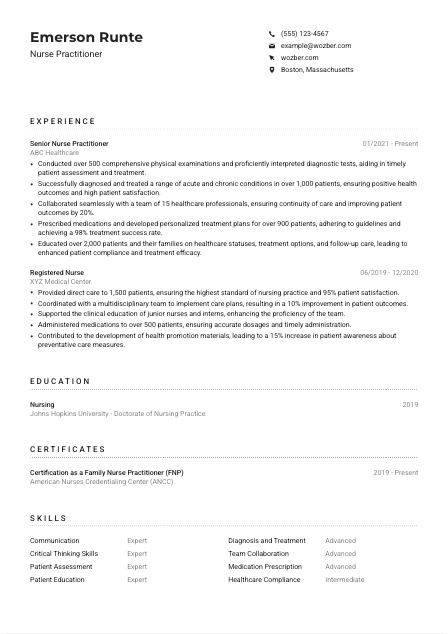
How to write a Nurse Practitioner CV?
Hello, aspiring Nurse Practitioner! Taking a leap into the medical field is no small feat, especially when aiming for that coveted Nurse Practitioner position. Your CV isn't just a piece of paper; it's a key that unlocks doors to life-changing opportunities.
With precise customization and attention to the nuances of this noble profession, we'll guide you through crafting a document that doesn't just pass through the Applicant Tracking System (ATS) but stands out to human eyes as well. Equipped with Wozber's free CV builder, ATS-friendly CV template, and insights into ATS optimisation, let's dive into creating a CV that speaks volumes of your dedication and skills.
Personal Details
The ‘Personal Details' section is more than just a formality; it's your opening salvo in the battle for attention. Within the healthcare industry, precision and professionalism are paramount. Here's how to ensure your introduction is seamless and impactful, setting the stage for the rest of your CV.
1. Name is Your Banner
Consider your name the banner under which you'll champion your cause. Use a clear, professional font that heralds you as the serious candidate you are. Make it slightly larger to draw the eye but maintain the balance of aesthetics and professionalism.
2. Title with Precision
Right below your name, align yourself with the job title - in this case, 'Nurse Practitioner.' It's like wearing your ambition on your sleeve and shows the hiring manager at a glance that you're exactly what they're looking for.
3. Crucial Contact Information
Ensure your phone number and professional email address (think firstname.lastname@domain.com) are front and center. Double-check for errors; even a minor typo can be the barrier between you and your dream job.
4. Location Matters
Mentioning 'Boston, Massachusetts' upfront satisfies one of the job's logistical requirements directly. It assures potential employers of your availability in the required area, making you a more convenient choice.
5. Professional Online Presence
In today's digital world, a LinkedIn profile or a professional website can provide deeper insights into your professional persona. Ensure they're pristine and reflective of your CV. This broadens your profile's horizon beyond the constraints of paper.
Takeaway
Your 'Personal Details' section is the handshake before the substantive conversation begins. It introduces you not just as an applicant, but as the Nurse Practitioner worth getting to know. Craft it with care, align it with the job requirements, and set the tone for the impact you're about to make.





Experience
The 'Experience' section is where you prove your mettle. For Nurse Practitioners, it's not just about the procedures or the number of patients; it's about the quality of care, the improvement in patient outcomes, and the collaborations that enhanced the healthcare delivery system.
- Conducted over 500 comprehensive physical examinations and proficiently interpreted diagnostic tests, aiding in timely patient assessment and treatment.
- Successfully diagnosed and treated a range of acute and chronic conditions in over 1,000 patients, ensuring positive health outcomes and high patient satisfaction.
- Collaborated seamlessly with a team of 15 healthcare professionals, ensuring continuity of care and improving patient outcomes by 20%.
- Prescribed medications and developed personalized treatment plans for over 900 patients, adhering to guidelines and achieving a 98% treatment success rate.
- Educated over 2,000 patients and their families on healthcare statuses, treatment options, and follow‑up care, leading to enhanced patient compliance and treatment efficacy.
- Provided direct care to 1,500 patients, ensuring the highest standard of nursing practice and 95% patient satisfaction.
- Coordinated with a multidisciplinary team to implement care plans, resulting in a 10% improvement in patient outcomes.
- Supported the clinical education of junior nurses and interns, enhancing the proficiency of the team.
- Administered medications to over 500 patients, ensuring accurate dosages and timely administration.
- Contributed to the development of health promotion materials, leading to a 15% increase in patient awareness about preventative care measures.
1. Reflect on the Job Requirements
Begin by dissecting the job listing. Each requirement, like 'Conduct comprehensive physical examinations,' should be echoed in your CV, demonstrating your direct experience and expertise.
2. Chronology and Relevance
Structure your experience chronologically, starting with your most recent position. This helps hiring managers grasp your career progression and current capabilities. Ensure each role listed is relevant to being a Nurse Practitioner, honing in on specifics like patient assessments or treatment planning.
3. Specific Accomplishment Statements
For each role, articulate your accomplishments and responsibilities that mirror the job's demands. Specify how you excelled in conducting thorough physical examinations or developed effective patient treatment plans, providing concrete numbers where possible to underscore your impact.
4. Quantify Your Impact
Numbers speak volumes. Whether it's the number of patient assessments you've led, the patient satisfaction ratings you've contributed to, or team initiatives that improved outcomes by a certain percentage, quantifying your achievements makes them tangible and memorable.
5. Relevance is Key
Keep your focus laser-sharp. Unrelated accolades, while impressive, can distract from your fit for this specific role. Every entry should build the case for you as the ideal Nurse Practitioner for the job at hand.
Takeaway
Your 'Experience' section is more than a list; it's a narrative of your journey and impact as a healthcare professional. Tailor it with purpose, emphasizing how your clinical acumen and compassionate care align with the role's requirements. You're not just sharing your history; you're showcasing your readiness to make a difference in this new capacity.
Education
For Nurse Practitioners, the 'Education' section is foundational, reflecting not only your qualifications but your commitment to the vocation. It's about proving you have the academic backbone to support your hands-on expertise.
1. Identify Key Educational Requirements
The job description asks for a 'Master's or Doctorate degree in Nursing from an accredited institution.' Your CV should mirror this requirement verbatim if you meet it, positioning your education as a direct match.
2. Simple, Clear Structure
Maintain clarity with a straightforward layout: list your degree, the field of study, the institution, and graduation date. This makes it easy for hiring managers to verify your credentials against their requirements.
3. Degree Details Matter
If your degree aligns exactly with the job listing (for example, 'Master of Science in Nursing'), it's crucial to list it as such, even tailoring the language to match. This facilitates an immediate connection between your qualifications and the job's needs.
4. Relevant Courses and Achievements
For recent graduates or those with less work experience, highlighting specific courses or academic achievements related to nursing can bolster your CV. Though not explicitly required for this role, they can demonstrate your dedication and expertise.
5. Other Educational Accolades
Include honors, clubs, or relevant projects if they showcase your commitment to nursing or leadership capabilities. Remember, for more experienced roles, focus more on professional achievements unless the academic ones are directly relevant.
Takeaway
Your 'Education' section lays the academic foundation of your expertise, but it's also a testament to your dedication to the nursing profession. Make sure it aligns with the requirements, resonating with the depth of knowledge and commitment you bring to the role. It's not just about having the degree; it's about showcasing how your education has prepared you to excel as a Nurse Practitioner.
Certificates
In the healthcare realm, certifications are your armor. They validate your skills, continuous learning and adherence to the highest standards. For a Nurse Practitioner, the right certifications can set you apart and reassure employers of your commitment to excellence.
1. Review the Essentials
The job specifies a 'Certification as a Nurse Practitioner by a recognized national certifying body such as ANCC or AANP.' Your CV must list any relevant certifications you hold, especially those directly requested in the job posting, making them easy to find.
2. Prioritize Pertinence
Highlight certifications most relevant to the Nurse Practitioner role, especially if space is limited. While it's great to have a broad range of qualifications, focus on the ones that best support your candidacy for this specific job.
3. Dates Do Matter
Including the dates for when you acquired your certifications is vital, especially if they have expiration dates. This assures prospective employers that your qualifications are current and you're committed to maintaining them.
4. Keep Evolving
Healthcare is forever advancing, and so should your credentials. Regularly seek out opportunities for continuing education that align with your career goals. It shows potential employers your dedication to your profession and personal growth.
Takeaway
Your certifications are powerful evidence of your qualifications and dedication to the Nurse Practitioner role. They underline your commitment to professional development and ensure you remain at the forefront of patient care. Position them prominently on your CV, and keep the information updated and relevant, showcasing your continuous journey towards excellence.
Skills
The 'Skills' section of your CV is a compact display of your professional proficiencies. Here, clarity and relevance shine. For a Nurse Practitioner, highlighting both your clinical acumen and empathetic patient care is crucial to establishing your fit for the role.
1. Extract from Job Description
Start by pulling specific skills mentioned in the job listing, like 'Strong interpersonal, communication, and critical thinking skills.' Your CV should reflect these not only because they're requested, but because they're integral to your role.
2. Match and Highlight
Parallel the job description with your own skill set. Prioritize listing skills that resonate most with those sought for the position. This might include 'Effective English language skills' along with clinical competencies like 'Patient Assessment' and 'Treatment Planning.'
3. Organized Presentation
Resist the urge to list every skill you possess. Focus on the most relevant ones that align with the job listing and will grab the hiring manager's attention. This curated approach showcases your qualifications more effectively.
Takeaway
The 'Skills' section is your chance to shine a spotlight on your diverse professional toolkit. Approach it strategically, aligning your skills with the job requirements and presenting them in a clear, concise manner. Highlighting your unique blend of clinical expertise and compassionate patient care echoes your readiness to excel as a Nurse Practitioner.
Languages
In an increasingly interconnected world, and especially in diverse urban centers like Boston, the ability to communicate in multiple languages can be a significant asset in healthcare. While the job might require 'Effective English language skills,' showcasing additional language proficiencies could make you stand out.
1. Job Language Requirements
The job posting specifies 'Effective English language skills.' Highlight your proficiency in English at the top, specifying whether it's 'Native' or 'Fluent.' This direct alignment reassures the employer of your communication capabilities.
2. List Additional Languages
Beyond the essentials, list any other languages you're proficient in. Being able to communicate with a broader patient base in their native language can be a valuable asset, showcasing your versatility and empathy.
3. Honest Proficiency Levels
Be transparent about your level of proficiency in each language. Whether 'Fluent,' 'Intermediate,' or 'Basic,' accurate self-assessment instills trust and sets realistic expectations for your linguistic capabilities.
4. Consider the Role's Scope
In positions where you're dealing with diverse populations or in regions with significant non-English-speaking communities, being multilingual can be an edge. Even if not explicitly required, it underscores your capacity for empathetic patient care.
5. Continuous Learning
View language skills as part of your ongoing professional development. Engage in learning opportunities to improve your language proficiencies, especially those relevant to your patient demographic. This commitment can enhance your role effectiveness and patient relationships.
Takeaway
Your language skills are a bridge to understanding, empathy, and trust in healthcare settings. While meeting the basic job criteria is paramount, showcasing additional proficiencies can position you as a versatile and compassionate caretaker, ready to connect with patients in their language of comfort. Embrace and highlight your linguistic capabilities, viewing them as part of your professional toolkit that advances patient care.
Summary
A compelling 'Summary' offers a quick, powerful glimpse into your professional identity. For Nurse Practitioners, it's an opportunity to weave your experience, skills, and heartfelt dedication to patient care into a narrative that resonates with hiring managers.
1. Grasp the Job's Core
Your summary should reflect a deep understanding of the Nurse Practitioner role. Incorporate aspects like 'over 3 years of experience in clinical patient care' to immediately signal your suitability and experience.
2. Start with Strength
Lead with a strong opening that positions you as a dedicated and skilled Nurse Practitioner. Highlight your prowess in areas like 'conducting comprehensive physical examinations' and 'diagnosing and treating various conditions,' directly echoing the job's requirements.
3. Highlight Key Skills and Achievements
Mention your core competencies and major accomplishments. For instance, showcase your 'effective communication and patient education' skills and your impact on 'improving patient outcomes by 20%.' This concisely signals your value and alignment with the job expectations.
4. Keep It Concise
Aim for 3-5 impactful lines. Your summary is a teaser, meant to intrigue and invite further reading. Pack it with punchy, precise statements that encapsulate your Nurse Practitioner ethos.
Takeaway
Your summary is the lens through which hiring managers first view you. Make it a crystal-clear reflection of your dedication, skills, and preparedness for the Nurse Practitioner role. Let it be an inviting beacon that guides them through the rest of your carefully crafted CV, leaving them eager to learn more about you. Remember, each word counts towards painting a picture of a healthcare professional poised to make a difference.
Launching Your Nurse Practitioner Journey
Congratulations on meticulously tailoring your Nurse Practitioner CV, aligning it with both the art and science of the profession. With the guidance provided here, powered by Wozber's free CV builder, ATS-friendly CV format, and ATS CV scanner, you've crafted not just a document, but a testament to your capabilities and vision for patient care. Your CV is now ready to open doors to opportunities where you can truly thrive. Delve into the world with confidence, ready to bring your invaluable skills to those in need.
The healthcare industry awaits your unique contributions. Make your mark and shape a healthier, happier future.

- Master's or Doctorate degree in Nursing from an accredited institution.
- Current and unrestricted RN and NP licenses in the state of practice.
- Certification as a Nurse Practitioner by a recognized national certifying body such as ANCC or AANP.
- Minimum of 2 years of experience in a clinical nursing setting, preferably in a specialty relevant to the position.
- Strong interpersonal, communication, and critical thinking skills.
- Effective English language skills are a key requirement.
- Must be located in Boston, Massachusetts.
- Conduct comprehensive physical examinations and interpret diagnostic tests.
- Diagnose and treat acute and chronic conditions, as well as provide preventive care and counseling.
- Collaborate with other healthcare professionals to ensure quality and continuity of care.
- Prescribe medications and develop patient treatment plans in accordance with guidelines and protocols.
- Educate patients and families on healthcare status, treatment options, and follow-up care.





